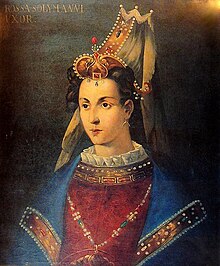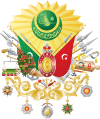Draft:Alexandra Larosa
| Submission declined on 17 June 2024 by Liance (talk). This submission is not adequately supported by reliable sources. Reliable sources are required so that information can be verified. If you need help with referencing, please see Referencing for beginners and Citing sources.
Where to get help
How to improve a draft
You can also browse Wikipedia:Featured articles and Wikipedia:Good articles to find examples of Wikipedia's best writing on topics similar to your proposed article. Improving your odds of a speedy review To improve your odds of a faster review, tag your draft with relevant WikiProject tags using the button below. This will let reviewers know a new draft has been submitted in their area of interest. For instance, if you wrote about a female astronomer, you would want to add the Biography, Astronomy, and Women scientists tags. Editor resources
|  |
| Submission declined on 16 June 2024 by Ratnahastin (talk). This submission is not adequately supported by reliable sources. Reliable sources are required so that information can be verified. If you need help with referencing, please see Referencing for beginners and Citing sources. Declined by Ratnahastin 5 months ago. |  |
 Comment: Only cites Facebook and Amazon which are both not reliable sources ~Liancetalk 02:15, 17 June 2024 (UTC)
Comment: Only cites Facebook and Amazon which are both not reliable sources ~Liancetalk 02:15, 17 June 2024 (UTC)
- Furthermore, there is already a page on the topic, Roxelana. This is just a few poorly formatted snippets Sira Aspera (talk) 07:54, 17 June 2024 (UTC)
 Comment: Just a poor version of Roxelana with an invented title — Preceding unsigned comment added by Sira Aspera (talk • contribs) 13:07, 16 June 2024 (UTC)
Comment: Just a poor version of Roxelana with an invented title — Preceding unsigned comment added by Sira Aspera (talk • contribs) 13:07, 16 June 2024 (UTC)
Hurrem Sultan is a legal wife of Suleiman the Magnificent. She was the first Haseki Sultan of the Ottoman Empire.
| Hurrem Sultan | |
|---|---|
 Portait of Hurrem Sultan | |
| Haseki Sultan | |
| Tenure | c.1533-April 1558 |
| Predecessor | position established |
| Successor | Nurbanu Sultan |
| Born | Alexandra La rossa 1504,Rohatyn,Ruthenia. |
| Died | 1558,Topkapi Palace,Instanbul,Ottoman Empire |
| Burial | |
| Spouse | Suleiman the Magnificent |
| Issue | Sehzade Mehmed Mihrimah Sultan Selim I Sehzade Bayezid Sehzade Cihangir |
| Dynasty | Ottoman |
| Father | Hawryło Lisowski |
| Mother | Leksandra Lisowska |
| Religion | Islam (before,Chistianity Othrodox) |
Alexandra Larosa also known as Hurrem Sultan.She was the first Haseki Sultan of the Ottoman Empire.She was the legal wife of Suleiman the Magnificent.She was the most influential woman in the Ottoman History.
Relationship With Suleiman
[edit]Hürrem's unprecedented rise from harem slave to Suleiman's legal wife attracted jealousy and disfavor not only from her rivals in the harem, but also from the general populace. She soon became Suleiman's most prominent consort beside Mahidevran (also known as Gülbahar), and their relationship was monogamous
Issue
[edit]Suleiman and Hurrem Had 5 Children-
- Mehmed
- Mihrimah
- Selim
- Bayezid
- Cihangir
Death and Burial
[edit]Hürrem died on 15 April 1558 due to an unknown illness. In the last years of her life she was in very poor health. It is said that the Sultan, in order not to disturb the peace of his wife during the course of her illness, ordered all the musical instruments in the palace to be burned.
See also
[edit]- Ottoman dynasty
- Ottoman family tree
- List of mothers of the Ottoman sultans
- List of consorts of the Ottoman sultans
- Haseki Sultan Complex, Fatih, Istanbul
- Hagia Sophia Hurrem Sultan Bathhouse, Fatih, Istanbul
- Haseki Sultan Imaret, Jerusalem
- Suleiman the Magnificent
- Sultanate of Women
Notes
[edit]References
[edit]Further reading
[edit]- Peirce, Leslie (1993). Empress of the East: How a European Slave Girl Became Queen of the Ottoman Empire. New York Basic Books. ISBN 978-0-465-03251-8..
- Peirce, Leslie P. The Imperial Harem: Women and Sovereignty in the Ottoman Empire (Oxford University Press, 1993)
- There are many historical novels in English about Roxelana: P.J. Parker's Roxelana and Suleyman[1] (2012; Revised 2016); Barbara Chase Riboud's Valide (1986); Alum Bati's Harem Secrets (2008); Colin Falconer, Aileen Crawley (1981–83), and Louis Gardel (2003); Pawn in Frankincense, the fourth book of the Lymond Chronicles by Dorothy Dunnett; and pulp fiction author Robert E. Howard in The Shadow of the Vulture imagined Roxelana to be sister to its fiery-tempered female protagonist, Red Sonja.
- David Chataignier, "Roxelane on the French Tragic Stage (1561-1681)" in Fortune and Fatality: Performing the Tragic in Early Modern France, ed. Desmond Hosford and Charles Wrightington (Newcastle upon Tyne: Cambridge Scholars Publishing, 2008), 95–117.
- Parker, P. J. Roxelana and Suleyman (Raider Publishing International, 2011).
- Thomas M. Prymak, "Roxolana: Wife of Suleiman the Magnificent," Nashe zhyttia/Our Life, LII, 10 (New York, 1995), 15–20. An illustrated popular-style article in English with a bibliography.
- Galina Yermolenko, "Roxolana: The Greatest Empresse of the East," The Muslim World, 95, 2 (2005), 231–48. Makes good use of European, especially Italian, sources and is familiar with the literature in Ukrainian and Polish.
- Galina Yermolenko (ed.), Roxolana in European Literature, History and Culture (Farmham, UK: Ashgate, 2010). ISBN 9780754667612 318 pp. Illustrated. Contains important articles by Oleksander Halenko and others, as well as several translations of works about Roxelana from various European literatures, and an extensive bibliography.
- For Ukrainian language novels, see Osyp Nazaruk (1930) (English translation is available),[2] Mykola Lazorsky (1965), Serhii Plachynda (1968), and Pavlo Zahrebelnyi (1980).
- There have been novels written in other languages: in French, a fictionalized biography by Willy Sperco (1972); in German, a novel by Johannes Tralow (1944, reprinted many times); a very detailed novel in Serbo-Croatian by Radovan Samardzic (1987); one in Turkish by Ulku Cahit (2001).
References
[edit]- ^ "Roxelana and Suleyman". www.facebook.com. Archived from the original on 14 January 2017.
- ^ Nazaruk, Osyp (14 June 2017). Roxelana. June 14, 2017) – via Amazon.
External links
[edit]
Category:1500s births
Category:1558 deaths
Category:16th-century consorts of Ottoman sultans
Category:Ruthenian people
Category:Converts to Islam from Eastern Orthodoxy
Category:People from Ruthenian Voivodeship
Category:People from Rohatyn
Category:Ukrainian Muslims
Category:Former Ukrainian Orthodox Christians
Category:Suleiman the Magnificent
Category:Former Christians from the Ottoman Empire
Category:Mothers of Ottoman sultans
Category:Women slaves
Category:16th-century slaves
Category:Sultanate of Women
Category:Concubines of Ottoman sultans

